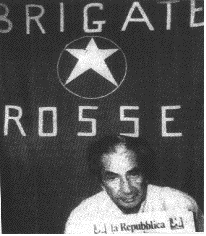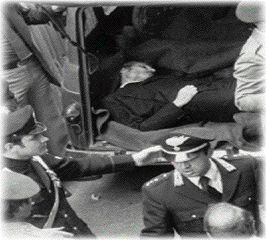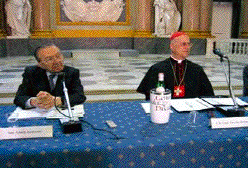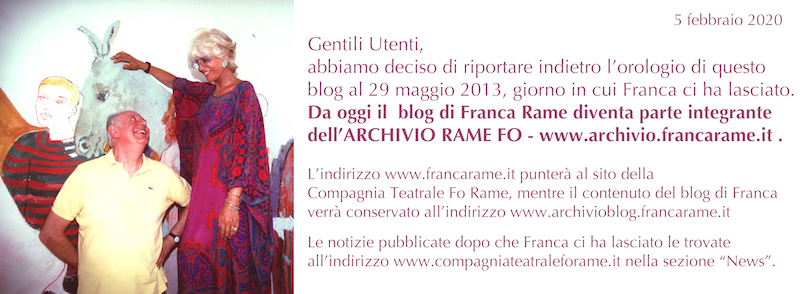 Qualche giorno dopo l’inizio della XV legislatura, il 3 maggio (2006),siamo stati convocati per eleggere il Presidente del gruppo mistico, pardon misto, al Senato. Mi ha confuso la presenza di alcuni democristiani: presiede Giulio Andreotti. Oh! Eccolo il capo mistico! Sono entrata in una delle grandi aule di palazzo Carpegna, non ricordo a quale piano, con un certo imbarazzo all’idea di incontrarmi con il più enigmatico fra tutti i Senatori a vita. Sicuramente Andreotti aveva letto i giornali di qualche giorno fa quando interpellata dai giornalisti: “Che farà quando incontrerà Andreotti?” rispondevo: “Andreotti?... Grigio più grigio del grigio…”
Qualche giorno dopo l’inizio della XV legislatura, il 3 maggio (2006),siamo stati convocati per eleggere il Presidente del gruppo mistico, pardon misto, al Senato. Mi ha confuso la presenza di alcuni democristiani: presiede Giulio Andreotti. Oh! Eccolo il capo mistico! Sono entrata in una delle grandi aule di palazzo Carpegna, non ricordo a quale piano, con un certo imbarazzo all’idea di incontrarmi con il più enigmatico fra tutti i Senatori a vita. Sicuramente Andreotti aveva letto i giornali di qualche giorno fa quando interpellata dai giornalisti: “Che farà quando incontrerà Andreotti?” rispondevo: “Andreotti?... Grigio più grigio del grigio…”

In più, incontrare l’enigmatico, dopo tutto quello che Dario aveva detto di lui in scena, mi faceva sentire proprio a disagio. Senza parlare della satira in cui lui, il Torquemada sghembo, Ministro della Cultura nel primo governo De Gasperi, giovane ma già braccio secolare del clero, era rappresentato come forsennato gestore della censura che arrivava a bloccare capolavori come la Mandragola di Machiavelli e l’Arialda di Testori, per non parlare del massacro dei nostri testi satirici al Piccolo Teatro! Beh, l’incontro è stato meno difficile di quanto pensassi. Entro, il senatore a vita stava appena oltrepassata la soglia. Mi accoglie con un gran sorriso, mi abbraccia e bacia sulle guance. “Cara piccina (testuale!) – mi dice, lasciandomi a bocca aperta – ti devo ringraziare… tu e Dario siete stati meravigliosi… avete fatto l’impossibile per aiutarci a conoscere dove i brigatisti tenessero nascosto Aldo Moro… grazie!” - “Presidente… lei è troppo gentile…. Ma io, quei terroristi, sono andata a incontrarli alle carceri Nuove di Torino, solo perché il capo gabinetto del ministro Bonifacio, dott. Selvaggi me l’aveva chiesto. Ero certa che quei detenuti non sapessero nulla… e avevo ragione. - e continuo - Ora che sono passati tanti anni, Presidente, mi potrebbe svelare per quale ragione non avete accettato, pur di salvare Moro, di liberare in cambio un gruppo di carcerati delle Br?


Al posto vostro li avrei lasciati andare. Liberato Moro, avreste tranquillamente potuto riarrestarli.” “No, non potevamo accettare quella soluzione poiché le Br volevano trattare per lo scambio come fossero lo Stato, da pari a pari.” “Sì, ma così è stato ucciso un uomo: Moro.” Mi ha guardato sconsolato, aprendo le braccia, come a dire: “Non si poteva fare diversamente…” All’istante m’è venuto in mente il Cardinal Siri, potentato massimo della Santa Sede, che a chi gli dava la notizia del sequestro Moro commentava: "Ha avuto ciò che si meritava". PROPRIO UN GRANDE “CRISTIANO”!
 La solita ragion di Stato, ovvero l’irragionevole rifiuto della ragione. E come un flash, m’è venuto avanti agli occhi Cirillo, pezzo grosso della DC napoletana, catturato sempre dai brigatisti tre anni dopo. In quel caso il Governo non frappone nessuna questione di Stato. Ci si serve perfino di mafiosi, si contratta, si versa tutto ciò che è richiesto (1 miliardo e 400 milioni di lire) ed ecco Cirillo libero e arzillo come un grillo… che fa pure rima! Ma come mai? Qual è l’inghippo?
La solita ragion di Stato, ovvero l’irragionevole rifiuto della ragione. E come un flash, m’è venuto avanti agli occhi Cirillo, pezzo grosso della DC napoletana, catturato sempre dai brigatisti tre anni dopo. In quel caso il Governo non frappone nessuna questione di Stato. Ci si serve perfino di mafiosi, si contratta, si versa tutto ciò che è richiesto (1 miliardo e 400 milioni di lire) ed ecco Cirillo libero e arzillo come un grillo… che fa pure rima! Ma come mai? Qual è l’inghippo?
Qualche malalingua insinua che il Cirillo, a differenza di Moro, non aveva certo in capo di traghettare il partito comunista di Berlinguer al governo, perciò con lui non si interposero questioni di dignità morale e difesa dell’autorità di Stato. Evviva! La straordinaria metamorfosi della ragione! A riprova del fatto che nella democrazia cristiana c’è un gene di resistenza eterna, volete sapere che fine ha fatto colui che trattò con la mafia per il rilascio di Ciro Cirillo?!? Ça va sans dire…. E’ Enzo Scotti, sottosegretario agli esteri del nuovo governo Berlusconi! 
 Quel giorno, senza intoppi, abbiamo eletto il presidente del gruppo misto: sen.
Quel giorno, senza intoppi, abbiamo eletto il presidente del gruppo misto: sen.
Nello Formisano, IDV. Vi avevo già accennato qualcosa a proposito di una mia assistente. Si chiama Giuliana, una giovane già collaboratrice di un senatore della precedente legislatura. Conosce bene il suo lavoro. Graziosa, capace. Per assumerla, bisogna stendere un contratto. In che forma? Mi viene consigliato… o in nero o co.co.pro.. Parlo con il mio commercialista, Giancarlo Merlino, e decidiamo per un più corretto contratto a tempo indeterminato. Qualcuno mi dice: “ Hai sbagliato, non sei nella norma.”
Scopro che la norma qui, ma più a Montecitorio, è quella di far passare i collaboratori per volontari… altri “onorevoli”, in gran numero, se la cavano con cifre miserabili, 500, 700 euro, in nero. Pochi sono quelli che assumono i collaboratori con contratti a tempo indeterminato. Per la verità, ho fatto un’inchiesta… sono risultata l’unica... fuori norma. E dire che, ognuno di noi, senatore o deputato, percepisce dallo Stato per il “portaborse” 5 mila euro al mese! Al proposito c’è stato un grande scandalo.
Nella trasmissione televisiva “Le iene”, hanno condotto un’inchiesta dove intervistavano parlamentari all’uscita da Montecitorio e chiedevano loro: “Onorevole, lei ha il portaborse?”, un nervosissimo “Sì.” e tiravano via infastiditi. Ma quelli insistevano: “È a contratto o è precario? Quanto lo paga?” Gli intervistati si mostrano molto a disagio, balbettano, abbozzano risposte davvero paradossali… tipo: “Mi sfugge… lo chieda a lei, alla mia collaboratrice…” E un altro: “Ho accettato una studentessa che fa pratica. Mi dovrebbe pagare lei!” E un altro ancora: “Anche la mia fa pratica, viene gratis: io non la pago, però l’aiuto a fare i compiti. E ogni tanto la invito perfino a cena!”
 Il migliore è stato l’On. Avv. Taormina, che intervistato dal grandioso Bernardo Iovene rispondeva più o meno così: “Io? Non ho collaboratori, non me ne faccio nulla, ho già uno studio grandioso… I soldi che prendo per il collaboratore li do a mia moglie che li usa per fare beneficenza ad un canile”.
Il migliore è stato l’On. Avv. Taormina, che intervistato dal grandioso Bernardo Iovene rispondeva più o meno così: “Io? Non ho collaboratori, non me ne faccio nulla, ho già uno studio grandioso… I soldi che prendo per il collaboratore li do a mia moglie che li usa per fare beneficenza ad un canile”. I contribuenti ringraziano la signora Taormina che fa beneficenza con il denaro pubblico…. Fatto sì è che il presidente della camera, Fausto Bertinotti, è stato costretto a togliere la possibilità d’ingresso agli assistenti, se non muniti di tesserino. Ne sono rimasti fuori un sacco. disoccupati. Ne parlo con alcuni veterani, commentando: “Mi sembra un po’ meschino far la cresta sullo stipendio di chi ci assiste!” Ognuno scantona. A ‘sto punto mi sfugge un commento, poco benevole: “Ho capito! -Dimenticavo che noi siamo la testa del pesce…!”
I contribuenti ringraziano la signora Taormina che fa beneficenza con il denaro pubblico…. Fatto sì è che il presidente della camera, Fausto Bertinotti, è stato costretto a togliere la possibilità d’ingresso agli assistenti, se non muniti di tesserino. Ne sono rimasti fuori un sacco. disoccupati. Ne parlo con alcuni veterani, commentando: “Mi sembra un po’ meschino far la cresta sullo stipendio di chi ci assiste!” Ognuno scantona. A ‘sto punto mi sfugge un commento, poco benevole: “Ho capito! -Dimenticavo che noi siamo la testa del pesce…!”  “Che vuoi dire?” mi chiedono. “E’ dalla nostra testa che si comincia a puzzare! E il tanfo poi si sparge per tutto l’emiciclo: dalla Camera al Senato! E si sente! Forse bisognerà chiamare una ditta di disinfestazione… di quelle pesanti, con lo spruzzo!” Nessuno ride… temo che questa sia la ragione per cui qua dentro non godo di tante amicizie…! Al proposito, in contatto con l’Associazione “precari parlamento” ho inviato all’Ansa un comunicato stampa: FRANCA RAME: MI UNISCO ALL’ APPELLO ASSOCIAZIONE PORTABORSE: BASTA COLLABORATORI IN NERO
“Che vuoi dire?” mi chiedono. “E’ dalla nostra testa che si comincia a puzzare! E il tanfo poi si sparge per tutto l’emiciclo: dalla Camera al Senato! E si sente! Forse bisognerà chiamare una ditta di disinfestazione… di quelle pesanti, con lo spruzzo!” Nessuno ride… temo che questa sia la ragione per cui qua dentro non godo di tante amicizie…! Al proposito, in contatto con l’Associazione “precari parlamento” ho inviato all’Ansa un comunicato stampa: FRANCA RAME: MI UNISCO ALL’ APPELLO ASSOCIAZIONE PORTABORSE: BASTA COLLABORATORI IN NERO

Cogliendo spunto dalla lettera che l’associazione portaborse ha inviato ai due candidati premier Veltroni e Berlusconi per chiedere che tra principi di candidabilità nelle liste elettorali vi sia anche l’obbligo di non avere collaboratori in nero, la Senatrice Franca Rame ha voluto formulare la sua richiesta ai due leader: “Nella mia esperienza da Senatrice m’è capitato di trovarmi testimone di un sopruso tra i più vergognosi: parlamentari, di entrambi gli schieramenti, che in Aula difendono i diritti dei lavoratori e condannano il lavoro sommerso, hanno loro stessi negli uffici collaboratori che intascano una miseria e non hanno alcun tipo di contratto, né garanzia. E’ abominevole che questo accada, mi aggiungo quindi all’appello dei collaboratori parlamentari, affinché questo malcostume abbia fine. Ho presentato qualche tempo fa un disegno di legge per mettere fine a questa pratica. (IL DDL PRECARIATO SEGUE A FINE PUNTATA) Ma non è di per sé sconvolgente? Serve una legge per mettere in riga in i parlamentari? Non dovrebbe essere il buonsenso a spingere i rappresentati dei cittadini a non avere collaboratori in nero?”
SENATO DELLA REPUBBLICA XV LEGISLATURA ———– N. 1626 DISEGNO DI LEGGE d’iniziativa dei senatori RAME, FORMISANO, CAFORIO, GIAMBRONE, BARBATO, CUSUMANO, FUDA, LEVI MONTALCINI, PALLARO, ROSSI Fernando e TURIGLIATTO COMUNICATO ALLA PRESIDENZA IL 12 GIUGNO 2007
Norme per l’ordinamento della professione di collaboratore parlamentare Onorevoli Senatori: Il presente disegno di legge si pone l’obiettivo di affrontare il problema delle collaborazioni parlamentari, ovverosia di quelle circa ottocento persone che supportano il lavoro dei parlamentari e che ancora non si vedono riconosciuta, contrattualmente, la loro professionalità. Sicché, proprio per evitare abusi, forme surrettizie di sfruttamento, sacche di lavoro in nero e, al tempo stesso, per far emergere alla luce del sole professionalità tanto importanti ed utili che operano nel Parlamento, nelle sue strutture e attraverso i suoi mezzi, per supportare il lavoro quotidiano degli eletti, il presente disegno di legge mira a porre in essere delle norme che garantiscano questa figura professionale, dandole dignità e pieni diritti all’interno del nostro ordinamento. In questo senso, rivestendo questa figura professionale il carattere di atipicità, si è previsto che ai collaboratori parlamentari debba essere applicato il contratto collettivo nazionale per i dipendenti degli studi professionali e che, proprio in considerazione del necessario vincolo fiduciario che lega questi al parlamentare, tale contratto debba essere a tempo determinato e con scadenza al termine della legislatura. Si è previsto, altresì, per rendere più evidente e certificato questo tipo di contratto, l’istituzione di un Albo dei collaboratori parlamentari che consenta a questi ultimi di godere, anche in termini professionali, di maggiore visibilità e di dimostrare, da parte dei loro datori di lavori, un’ampia trasparenza al pubblico rispetto alle persone che li assistono nelle loro attività.
DISEGNO DI LEGGE Art. 1. (Oggetto) 1. Ai fini della presente legge, per «collaboratore parlamentare» si intende colui o colei che supporta nella sua attività quotidiana il parlamentare e che, conseguentemente, è iscritto nell’apposito Albo dei collaboratori parlamentari di cui all’articolo 4. Art. 2. (Rapporto di lavoro) 1. Ai collaboratori parlamentari di cui all’articolo 1 si applica il contratto collettivo nazionale per i dipendenti degli studi professionali e, quindi, i diritti e i doveri che dal medesimo contratto collettivo discendono, sia per il collaboratore sia per il parlamentare. 2. La durata del rapporto di lavoro dei collaboratori parlamentari con il singolo parlamentare, stante la natura fiduciaria del rapporto, è definita a tempo determinato e comunque non può oltrepassare il termine della legislatura. Art. 3. (Licenziamento) 1. Il collaboratore parlamentare può essere licenziato, ai sensi del contratto collettivo nazionale di cui all’articolo 2, per giusta causa, ragione nella quale si ricomprende anche il venir meno del rapporto fiduciario. Art. 4. (Albo dei collaboratori parlamentari) 1. Al momento della stipula del contratto di collaboratore parlamentare, questi si iscrive, senza alcuna spesa, ad un Albo dei collaboratori parlamentari, pena l’inibizione dall’ingresso nelle sedi del Parlamento. Il predetto Albo è aggiornato periodicamente a cura di ciascuna Amministrazione parlamentare ed è depositato presso gli Uffici dei parlamentari Questori. 2. L’Albo dei collaboratori parlamentari di cui al comma 1 è pubblicamente accessibile e disponibile al pubblico anche via internet, rispettivamente nei siti internet di ciascun ramo del Parlamento. 3. L’iscrizione all’Albo dei collaboratori parlamentari è un titolo valido per la frequenza dei corsi di aggiornamento e di studio promossi dalle Amministrazioni degli organi parlamentari. Art. 5. (Disposizioni finali) 1. Nessun obbligo né vincolo deriva alle Amministrazioni parlamentari a seguito della stipula di un contratto di collaboratore parlamentare ai sensi della presente legge.
INGLESE:
A BRIEF VISIT TO THE SENATE by Franca Rame
English Version
Translated by Elizabeth Pyjov
Department of Romance Languages and Literatures, Harvard University
Adviser: Prof. Walter Valeri
PART III
A few days after the beginning of the XV legislature, May 3rd 2006, we were summoned to choose the president of the mystic – pardon, the mixed – group of the Senate. I was confused by the presence of some members of the Democratic-Christian party. Giulio Andreotti was presiding. Oh! There’s the mystic leader! I entered in one of the large rooms of the palazzo Carpegna building, I don’t remember which floor, with a certain embarrassment at the idea of finding myself meeting the most enigmatic senator ever. Surely Andreotti had read the newspapers that came out a few days ago; when journalists asked me: “What will you do when you meet Andreotti?” I replied: “Andreotti? – grey that’s the most grey of all grey…”
Also meeting this enigmatic one, after all that Dario had said about him on stage, made me feel really uncomfortable. Without mentioning the satire in which Giulio Andreotti, the humped Torquemada, the Minister of Culture in the first government of De Gaspari, the young but already secular right arm of the clergy, had been represented as the furious administrator of the censorship who censored masterpieces such as the Mandragola by Machiavelli and Arialda by Testori, not to mention the massacre of our satiric texts in the Piccolo Teatro! Well, meeting him turned out to be less difficult than I thought. I enter just as this senator for life passes the threshold. He welcomes me with a big smile, hugs me, and kisses my gloves. “Dear little one (this is from a text!) – he tells me, leaving me with my jaw dropped – I need to thank you … you and Dario were marvelous … you did the impossible to help us find out where the red brigade had hidden Aldo Moro… thank you!” – “President … you’re too kind … But I went to meet those terrorists at the jails Nuove de Torino only because the head of the cabinet of the minister Bonifacio, doctor Selvaggi, had asked me to. I was sure that those detained didn’t know anything … and I was right. – I continue – Now that so many years have passed, President, could you please reveal the reason why you had not agreed to also save Moro, to free him in exchange for a group of prisoners of the red brigade? In your position I would have let them go. Once you had liberated Moro, you would have easily been able to arrest them again.” “No, we couldn’t have accepted that solution since the red brigade wanted to handle the exchange as if they were the State, to treat them as equals.” “Yes, but in this way a man had been killed: Moro.” He looked at me, disconsolate, opening his arms, as if saying: “It couldn’t have been done differently…” At that moment Cardinal Siri came to mind, the most powerful man of the Vatican government. He’s the one who commented when hearing the news of the kidnapping of Aldo Moro: “Moro got what he deserved. HE’S A REALLY A GREAT CHRISTIAN!”
This was the usual rationale of the state, or rather the unreasonable denial of rationale. And suddenly, Cirillo flashed before my eyes, a powerful man of the Neapolitan Democrazia Cristiana, captured by the very same red brigade three years later. In that case, the government is in line with the state. Even members of the Mafia are used to trying to free prisoners by bargaining. Through the mafia the kidnappers are paid whatever they want (1 billion 400 million lyres). And, there we go, Cirillo is as free and lively as a cricket! But how come? Where’s the catch? There’s some gossip going around that Cirillo, unlike Moro, certainly didn’t have in mind admitting the communist party of Berlinguer into the government. So with Cirillo questions of moral dignity and defense of the authority of the state did ’t get in the way. Hurray! The extraordinary metamorphosis of rationale! This is a demonstration of that fact that in a Christian democracy there’s an aspect of eternal resistance. Do you want to know what the man who cooperated with the mafia for the release of Ciro Cirillo has been up to lately?!? Ça va sans dire… This man is Enzo Scotti, undersecretary of international affairs of the new government of Berlusconi! That day, without any difficulty, we elected the president of the mixed group: senator Nello Formisano, Italia dei Valori. I already hinted at something about an assistant of mine. Her name is Giuliana. She’s a young assistant of the senate of the previous legislature. She does her job well. She’s pretty and clever. To hire her, it’s necessary to draw up a contract. What kind of contract? This is the advice I receive … or under the table or co.co.pro. I speak with my accountant, Giancarlo Merlino, and we decide on a more adequate contract for an indefinite period of time. Someone tells me: “You’ve made a mistake; you’re not following the norm.”
I discover that the norm here, but more so in Montecitorio is to make the assistants pass for volunteers … other “honorable ones”, for the most part, manage to pay them pitiful sums: 500, 700 euro under the table. There are few who hire assistants with contracts for an indefinite period of time. To tell the truth, I conducted an inquiry… I ended up the only one … outside the norm. And to say that each one of us, senator or deputy, receives 5 thousand euro a month from the state for a personal assistant! Because of this, there was a big scandal.
In the television program “the Hyenas”, they conducted an investigation in which they interviewed parliamentarians as they were going out of Montecitorio. They asked them: “Honorable parliamentarian, do you have a personal assistant?” A very nervous “Yes”, and they hurried on, irritated. But the interviewers insisted: “Is he contracted or temporary? How much do you pay him?” Those being interviewed become very uneasy, they stutter and give truly paradoxical answers, such as: “It escapes me … ask her, ask my assistant…” And another one: “I accepted a student who’s gaining experience. She should be the one paying me!” And still another: “Mine is also in gaining experience, and she comes for free: I don’t pay her, but I help her with her homework. And now and then I even invite her to dinner!” The highlight was the honorable lawyer Taormina, who, when interviewed by the magnificent Bernardo Iovene replied more or less like this: “Me? I don’t have assistants, I never take them, because I already have a large studio … The money I get for an assistant, I give to my wife, who then donates it to a dog kennel.” The taxpayers thank Mrs. Taormina who donates to charity with public money … The fact is that the president of the House of Deputies, Fausto Bertinotti, was forced to restrict entrance to only those assistants who were equipped with a pass. Many were left behind, unemployed. I talk about this with a few of the senior senators, commenting: “It seems a little petty to make money on the side with the salary of those who help us!” They all change the subject. At this point I blurt out a comment, hardly a benevolent one: “I understood! – I was forgetting that we are the head of the fish…!” “What do you mean?” they ask me. “It’s from our heads that the stench starts! And then the stench spreads through the whole hemicycle: from the House of Deputies to the Senate! And it’s felt! Maybe it’ll be necessary to call a disinfestations company …. those heavy-duty ones, with the spray!” No one laughs … I’m afraid this is the reason why I don’t enjoy too many friendships here inside …! In connection with the association “the temporary workers of the parliament”, I sent Ansa the press release: FRANCA RAME: I JOIN THE APPEAL OF THE ASSOCATION OF TEMPORARY ASSISTANTS: ENOUGH WITH ASSISTANTS UNDER THE TABLE.
Getting the idea from the letter that the association of temporary assistants had sent to two prime minister candidates, Veltroni and Berlusconi, asking that in order to be in the list of candidates there be the obligation to not have assistants under the table. Senator Franca Rame wanted to phrase her request to the two leaders in this way: “In my experience as senator, it’s happened that I’ve had to witnessed abuses of power; among the most shameful are the parliamentarians (of both wings) who in the courtroom defend the rights of workers and condemn the black economy, but in their own offices have assistants who earn a pitiful amount and have no contract and no guarantee of any kind. It’s abominable that this happens. I therefore join the appeal of parliamentarian assistants so that this malpractice comes to an end.
I presented some time ago a bill to end this practice (THE AGENDA FOR TEMPORARY WORKERS FOLLOWS AT THE END OF THIS PART). But isn’t this upsetting in its own right? That we need a law to keep the parliamentarians in line? Shouldn’t good common sense encourage the representatives of the citizens to not have assistants under the table?”
THE SENATE OF THE REPUBLIC XV LEGISLATURE ———– N. 1626 BILL of the initiative of senators RAME, FORMISANO, CAFORIO, GIAMBRONE, BARBATO, CUSUMANO, FUDA, LEVI, MONTALCINI, PALLARO, ROSSI Fernando e TURIGLIATTO PRESENTED TO THE PRESIDENCY THE 12TH OF JUNE 2007. The standards for the organization of the profession of the parliamentary assistant, Honorable Senators: This bill has the objective of addressing the issue of parliamentarian assistants, or rather of those eight hundred people who give aid to parliamentarians and whose professionalism still does not seem to be recognized by contract.
Therefore, in order to avoid these very abuses, forms of subreptitious exploitation, lots of work done under the table, and, at the same time, to foster professionalism, which is very important for the functioning of the Parliament, through its structures and resources, to support the daily work of the elected, the present bill aims to put in place standards that guarantee this professional position, giving them dignity and full rights inside our order. In this way, covering this professional figure with the character of the atypical, it’s provided for that a collective, national contract ought to be applied to the parliamentarian assistants for employees of professional studies and that, in consideration of the necessary trustee bond that binds those ones to the parliament, such a contract needs to be for a fixed term and with an expiration at the end of the term of the legislature. Moreover, it has been foreseen, to make this kind of contract more evident and documented, the institution of a Register of parliamentarian assistants who consent that collaborators should benefit from, in professional terms, the greatest visibility and to demonstrate, from the part of their employers, an ample transparency to the public in respect to the people who assist them in their activities.
BILL Article 1. (Object) 1. For the purpose of the current law, for the “parliamentarian collaborator”, it is intended for him/her who supports in his/her daily activity the parliamentary and who, consequently, is enrolled in the proper register of parliamentary collaborators which article 4 describes. 2. (Work relationship). 1. To the parliamentarian collaborators mentioned in article 1, applies a collective national contract for the employees of professional studies and, therefore, the rights and duties that derive from the same contract, both for the assistant and for the parliamentarian. 2. The duration of the work relationship of parliamentarian assistants with a single parliamentarian, on account of the natural trustee of the relationship, is defined by a fixed time and in any case cannot exceed the end of the term of legislature. Article 3 (Dismissal) 1. The parliamentarian assistant can be dismissed in accordance with the collective national contract which article 2 speaks of, for a good reason through which we understand the loss of the trustful relationship. Article 4 (Register of parliamentary collaborators) 1. At the moment of the stipulation of the contract of the parliamentarian assistant, he/she is registered, without any expense, to a Register of parliamentarian assistants. Otherwise, as penalty, entrance to the seats of parliament is prohibited. The above-mentioned Register is updated periodically, edited by each Parliamentary Administration and deposited near the offices of the parliamentary officers. 2. The Register of parliamentarian assistants, mentioned in part 1, is publicly accessible and available to the public even on the internet, on the internet sites of every branch of the Parliament. 3. The registration to the Register of parliamentary collaborators is a valid title for the attendance of refresher courses and of study promoted by the Administration of parliamentary bodies. Article 5 (Final orders) 1. No obligation nor bind derive from the parliamentarian administrations following the stipulation of the contract of parliamentary collaborators under this law.
 "Volete farvi quattro risate? Leggete Francesco Alberoni - sociologo del nulla, scalatore delle discese, esperto dell'ovvio - sul Corriere di oggi. Sulla prima pagina del Corriere, dove una volta scriveva Pasolini; oggi Alberoni. Dice Alberoni: "Sono convinto che l'Italia si riprenderà rapidamente. Prima di quanto tutti credano. E si riprenderà perché finalmente ha riacquistato il senso della realtà.
"Volete farvi quattro risate? Leggete Francesco Alberoni - sociologo del nulla, scalatore delle discese, esperto dell'ovvio - sul Corriere di oggi. Sulla prima pagina del Corriere, dove una volta scriveva Pasolini; oggi Alberoni. Dice Alberoni: "Sono convinto che l'Italia si riprenderà rapidamente. Prima di quanto tutti credano. E si riprenderà perché finalmente ha riacquistato il senso della realtà.

 Ecco il racconto di una docente di Storia testimone oculare
Ecco il racconto di una docente di Storia testimone oculare È una facoltà, ma non un diritto? Dicono fonti autorevoli che Giuliano Ferrara pone sull’aborto una “questione seria”. Chi lo nega, viene iscritto d’ufficio da Ernesto Galli della Loggia al partito dei faziosi e violenti che gli tirano le uova. Chi scrive questo articolo, invece, non avendo mai tirato uova a chicchessia ed essendo nel complesso una persona tollerante, vorrebbe sottoporre all’intelligenza del lettore alcune domande, forse irriverenti, ma di grande attualità. Nei giorni scorsi Ferrara ha scritto in prima pagina sul Foglio che la questione dell’aborto, con la 194, non c’entra nulla.
È una facoltà, ma non un diritto? Dicono fonti autorevoli che Giuliano Ferrara pone sull’aborto una “questione seria”. Chi lo nega, viene iscritto d’ufficio da Ernesto Galli della Loggia al partito dei faziosi e violenti che gli tirano le uova. Chi scrive questo articolo, invece, non avendo mai tirato uova a chicchessia ed essendo nel complesso una persona tollerante, vorrebbe sottoporre all’intelligenza del lettore alcune domande, forse irriverenti, ma di grande attualità. Nei giorni scorsi Ferrara ha scritto in prima pagina sul Foglio che la questione dell’aborto, con la 194, non c’entra nulla.  temi.repubblica.it/micromega-online/alex-zanotelli-la-criminalizzazione-dei-poveri-audio/
temi.repubblica.it/micromega-online/alex-zanotelli-la-criminalizzazione-dei-poveri-audio/.jpg) Berlusconi che fa una legge per salvare un’altra volta Rete4: chi l’avrebbe mai detto. Lo stupore e la costernazione serpeggiano in Parlamento e tra gli osservatori più accreditati, di pari passo con l’incredulità per il tentativo di mandare in prescrizione con un emendamento al pacchetto sicurezza il processo Mills, per ora sfumato grazie alla fiera resistenza di Bobo Maroni (il nuovo capo dell’opposizione). Non può essere, dev’esserci un equivoco.
Berlusconi che fa una legge per salvare un’altra volta Rete4: chi l’avrebbe mai detto. Lo stupore e la costernazione serpeggiano in Parlamento e tra gli osservatori più accreditati, di pari passo con l’incredulità per il tentativo di mandare in prescrizione con un emendamento al pacchetto sicurezza il processo Mills, per ora sfumato grazie alla fiera resistenza di Bobo Maroni (il nuovo capo dell’opposizione). Non può essere, dev’esserci un equivoco.  Infatti l’indomani bastò una sola votazione per eleggere Marini. Un senatore dei DS sussurrava in napoletano: “Quarcherùn(o) ha avut(o) chell(e) ch’ha demannat(o)! E chi è ‘u mariuolo ch’ha condott(o) ‘stu ricatt?” L’ho saputo il giorno appresso leggendo i quotidiani: il mariuolo era Clemente Mastella, il Padreterno dell’Irpinia, che aveva preteso il Ministero della Giustizia. E Prodi ha dovuto ammollarglielo.
Infatti l’indomani bastò una sola votazione per eleggere Marini. Un senatore dei DS sussurrava in napoletano: “Quarcherùn(o) ha avut(o) chell(e) ch’ha demannat(o)! E chi è ‘u mariuolo ch’ha condott(o) ‘stu ricatt?” L’ho saputo il giorno appresso leggendo i quotidiani: il mariuolo era Clemente Mastella, il Padreterno dell’Irpinia, che aveva preteso il Ministero della Giustizia. E Prodi ha dovuto ammollarglielo.  Qualche giorno dopo l’inizio della XV legislatura, il 3 maggio (2006),siamo stati convocati per eleggere il Presidente del gruppo mistico, pardon misto, al Senato. Mi ha confuso la presenza di alcuni democristiani: presiede Giulio Andreotti. Oh! Eccolo il capo mistico! Sono entrata in una delle grandi aule di palazzo Carpegna, non ricordo a quale piano, con un certo imbarazzo all’idea di incontrarmi con il più enigmatico fra tutti i Senatori a vita. Sicuramente Andreotti aveva letto i giornali di qualche giorno fa quando interpellata dai giornalisti: “Che farà quando incontrerà Andreotti?” rispondevo: “Andreotti?... Grigio più grigio del grigio…”
Qualche giorno dopo l’inizio della XV legislatura, il 3 maggio (2006),siamo stati convocati per eleggere il Presidente del gruppo mistico, pardon misto, al Senato. Mi ha confuso la presenza di alcuni democristiani: presiede Giulio Andreotti. Oh! Eccolo il capo mistico! Sono entrata in una delle grandi aule di palazzo Carpegna, non ricordo a quale piano, con un certo imbarazzo all’idea di incontrarmi con il più enigmatico fra tutti i Senatori a vita. Sicuramente Andreotti aveva letto i giornali di qualche giorno fa quando interpellata dai giornalisti: “Che farà quando incontrerà Andreotti?” rispondevo: “Andreotti?... Grigio più grigio del grigio…”


 La solita ragion di Stato, ovvero l’irragionevole rifiuto della ragione. E come un flash, m’è venuto avanti agli occhi Cirillo, pezzo grosso della DC napoletana, catturato sempre dai brigatisti tre anni dopo. In quel caso il Governo non frappone nessuna questione di Stato. Ci si serve perfino di mafiosi, si contratta, si versa tutto ciò che è richiesto (1 miliardo e 400 milioni di lire) ed ecco Cirillo libero e arzillo come un grillo… che fa pure rima! Ma come mai? Qual è l’inghippo?
La solita ragion di Stato, ovvero l’irragionevole rifiuto della ragione. E come un flash, m’è venuto avanti agli occhi Cirillo, pezzo grosso della DC napoletana, catturato sempre dai brigatisti tre anni dopo. In quel caso il Governo non frappone nessuna questione di Stato. Ci si serve perfino di mafiosi, si contratta, si versa tutto ciò che è richiesto (1 miliardo e 400 milioni di lire) ed ecco Cirillo libero e arzillo come un grillo… che fa pure rima! Ma come mai? Qual è l’inghippo?
 Quel giorno, senza intoppi, abbiamo eletto il presidente del gruppo misto: sen.
Quel giorno, senza intoppi, abbiamo eletto il presidente del gruppo misto: sen. Il migliore è stato l’On. Avv. Taormina, che intervistato dal grandioso Bernardo Iovene rispondeva più o meno così: “Io? Non ho collaboratori, non me ne faccio nulla, ho già uno studio grandioso… I soldi che prendo per il collaboratore li do a mia moglie che li usa per fare beneficenza ad un canile”.
Il migliore è stato l’On. Avv. Taormina, che intervistato dal grandioso Bernardo Iovene rispondeva più o meno così: “Io? Non ho collaboratori, non me ne faccio nulla, ho già uno studio grandioso… I soldi che prendo per il collaboratore li do a mia moglie che li usa per fare beneficenza ad un canile”. I contribuenti ringraziano la signora Taormina che fa beneficenza con il denaro pubblico…. Fatto sì è che il presidente della camera, Fausto Bertinotti, è stato costretto a togliere la possibilità d’ingresso agli assistenti, se non muniti di tesserino. Ne sono rimasti fuori un sacco. disoccupati. Ne parlo con alcuni veterani, commentando: “Mi sembra un po’ meschino far la cresta sullo stipendio di chi ci assiste!” Ognuno scantona. A ‘sto punto mi sfugge un commento, poco benevole: “Ho capito! -Dimenticavo che noi siamo la testa del pesce…!”
I contribuenti ringraziano la signora Taormina che fa beneficenza con il denaro pubblico…. Fatto sì è che il presidente della camera, Fausto Bertinotti, è stato costretto a togliere la possibilità d’ingresso agli assistenti, se non muniti di tesserino. Ne sono rimasti fuori un sacco. disoccupati. Ne parlo con alcuni veterani, commentando: “Mi sembra un po’ meschino far la cresta sullo stipendio di chi ci assiste!” Ognuno scantona. A ‘sto punto mi sfugge un commento, poco benevole: “Ho capito! -Dimenticavo che noi siamo la testa del pesce…!”  “Che vuoi dire?” mi chiedono. “E’ dalla nostra testa che si comincia a puzzare! E il tanfo poi si sparge per tutto l’emiciclo: dalla Camera al Senato! E si sente! Forse bisognerà chiamare una ditta di disinfestazione… di quelle pesanti, con lo spruzzo!” Nessuno ride… temo che questa sia la ragione per cui qua dentro non godo di tante amicizie…! Al proposito, in contatto con l’Associazione “precari parlamento” ho inviato all’Ansa un comunicato stampa: FRANCA RAME: MI UNISCO ALL’ APPELLO ASSOCIAZIONE PORTABORSE: BASTA COLLABORATORI IN NERO
“Che vuoi dire?” mi chiedono. “E’ dalla nostra testa che si comincia a puzzare! E il tanfo poi si sparge per tutto l’emiciclo: dalla Camera al Senato! E si sente! Forse bisognerà chiamare una ditta di disinfestazione… di quelle pesanti, con lo spruzzo!” Nessuno ride… temo che questa sia la ragione per cui qua dentro non godo di tante amicizie…! Al proposito, in contatto con l’Associazione “precari parlamento” ho inviato all’Ansa un comunicato stampa: FRANCA RAME: MI UNISCO ALL’ APPELLO ASSOCIAZIONE PORTABORSE: BASTA COLLABORATORI IN NERO
 Primi di maggio… Sto cercando casa… la trovo. Pensa un po’ te! Proprio in piazza del Pantheon! È un piccolo appartamento l primo piano, con poca luce e privo di riscaldamento. Ci dovrò pensare da me… Per di più è un po’ caro… ma quando apro la finestra e mi ritrovo davanti la grande ellisse del Pantheon con la sua enorme cupola, la più antica del mondo, esclamo: “Questa immagine mi libera da ogni remora e magoni vari!” Dario non vuole che stia a Roma da sola, il 9 maggio mi ha raggiunto Marina Belloni, AMICA-COMPAGNA. Mi è di grande aiuto. Mi dà una serenità sapere che Marina è con me… abita con me… che bellezza, non mi sento più sola. Si occupa con Giuliana dell’ufficio.
Primi di maggio… Sto cercando casa… la trovo. Pensa un po’ te! Proprio in piazza del Pantheon! È un piccolo appartamento l primo piano, con poca luce e privo di riscaldamento. Ci dovrò pensare da me… Per di più è un po’ caro… ma quando apro la finestra e mi ritrovo davanti la grande ellisse del Pantheon con la sua enorme cupola, la più antica del mondo, esclamo: “Questa immagine mi libera da ogni remora e magoni vari!” Dario non vuole che stia a Roma da sola, il 9 maggio mi ha raggiunto Marina Belloni, AMICA-COMPAGNA. Mi è di grande aiuto. Mi dà una serenità sapere che Marina è con me… abita con me… che bellezza, non mi sento più sola. Si occupa con Giuliana dell’ufficio.  Mi dà consigli… è davvero preziosa, in più ridiamo, ci facciamo dei bei pranzetti, ci guardiamo la televisione. Giuliana, Marina… siamo tutte e tre molto attive. La mattina mi sveglio sempre presto… arrivo a Palazzo Madama che l’aula è ancora chiusa. Vado nella sala lettura-computer e mi metto a lavorare. Faccio come di regola una visitina al mio blog, rispondo alle tante lettere davvero stimolanti che in molti mi mandate… Oh, tu guarda… c’è un tipo che ce l’ha con me. Vorrebbe ammazzarmi a bastonate. Mi fermo un attimo, o forse più a meditare… In tempi passati ho subìto violenze e il solo pensiero che atti “aberranti” possano colpirmi
Mi dà consigli… è davvero preziosa, in più ridiamo, ci facciamo dei bei pranzetti, ci guardiamo la televisione. Giuliana, Marina… siamo tutte e tre molto attive. La mattina mi sveglio sempre presto… arrivo a Palazzo Madama che l’aula è ancora chiusa. Vado nella sala lettura-computer e mi metto a lavorare. Faccio come di regola una visitina al mio blog, rispondo alle tante lettere davvero stimolanti che in molti mi mandate… Oh, tu guarda… c’è un tipo che ce l’ha con me. Vorrebbe ammazzarmi a bastonate. Mi fermo un attimo, o forse più a meditare… In tempi passati ho subìto violenze e il solo pensiero che atti “aberranti” possano colpirmi ancora, mi paralizza. Calma, mi dico. Calma. Sarà il solito mitomane che si vuol mettere in vista. E non ci penso più. 10 maggio Mi sono svegliata alle 5,25… dalla fame. Mi capita di saltare la cena per pigrizia… mi faccio una bella tazza di latte con l’orzo… la inzuppo di biscotti. Poi mi riaddormento, mi dico. No, niente. Sveglia come un grillo. Decido per una camminata. E via che esco. Mi piace girare per Roma con poca gente intorno. Mi guardo palazzo Chigi.
ancora, mi paralizza. Calma, mi dico. Calma. Sarà il solito mitomane che si vuol mettere in vista. E non ci penso più. 10 maggio Mi sono svegliata alle 5,25… dalla fame. Mi capita di saltare la cena per pigrizia… mi faccio una bella tazza di latte con l’orzo… la inzuppo di biscotti. Poi mi riaddormento, mi dico. No, niente. Sveglia come un grillo. Decido per una camminata. E via che esco. Mi piace girare per Roma con poca gente intorno. Mi guardo palazzo Chigi. Penso a Prodi: potrebbe anche invitarmi una volta a pranzo. Ho incontrato qualche giorno fa la signora Flavia, sua moglie, che se ne andava tutta sola nei pressi della gelateria Giolitti. Ci siamo salutate con simpatia. M’ha dato anche del tu… Vado in via del Corso a guardarmi le vetrine. In fin dei conti sono una donna, e ogni tanto mi piace vedere che ti offrono i negozi di abbigliamento. C’è qualcosa che mi piacerebbe comprare
Penso a Prodi: potrebbe anche invitarmi una volta a pranzo. Ho incontrato qualche giorno fa la signora Flavia, sua moglie, che se ne andava tutta sola nei pressi della gelateria Giolitti. Ci siamo salutate con simpatia. M’ha dato anche del tu… Vado in via del Corso a guardarmi le vetrine. In fin dei conti sono una donna, e ogni tanto mi piace vedere che ti offrono i negozi di abbigliamento. C’è qualcosa che mi piacerebbe comprare  (mi sembrano abiti adatti a una carica istituzionale così prestigiosa). Ma sono chiusi. Tornerò. Dico sempre così, poi non torno. Non c’è il tempo. Non avrei mai creduto si lavorasse tanto in Senato. Si corre anche molto. Anzi: sempre. impegni uno appresso all’altro. Non che si combini molto… Entro a Palazzo Madama. Oggi all’ingresso ci sono due marinaretti. Il solito scatto di tacchi e: “AAAttteeentiiii!”. Ma si deve spaventare la gente così, di prima mattina?! Ciao ciao soldatini. Sono le 9,45. Ho tutto il tempo che voglio per prendere un bel cappuccino con cornetto. La buvette è affollatissima. Saluto qua e là. Qualcuno risponde. C’è anche la Finocchiaro. Le sorrido. Mi guarda senza un cenno di risposta. L’unica volta che mi sono sentita chiamare con affetto “Francuzza” dalla senatrice Finocchiaro, è stato quando ho votato sì, dopo mille perplessità, alla finanziaria. Ma di questo racconterò più avanti…. E’ la mia trasparenza che mi colpisce. Chissà perché ha difficoltà a salutare. Trovo il suo atteggiamento ridicolo. Poi penso. Forse non mi ha visto. Forse è miope… cieca. Oh poverina, dovrebbe venire accompagnata da un cane. Chissà che in futuro riesca a scendere dal piedistallo su cui si è sistemata. Sarebbe piacevole. Speriamo in un futuro di dialogo, e non solo con lei. Un’altra dal saluto difficile è la ministra della Sanità: la Turco. (nei due anni di Senato non mi ha mai salutato. Peggio per lei!) Chissà cosa si trovano nella teste ‘ste signore… a che livello dell’atmosfera vivono? Non posso trattenermi dal muovere la testa da sinistra a destra e da destra a sinistra… pensando a sua maestà la regina di Svezia, che ha dialogato a lungo con Dario e la sottoscritta in occasione del premio Nobel,
(mi sembrano abiti adatti a una carica istituzionale così prestigiosa). Ma sono chiusi. Tornerò. Dico sempre così, poi non torno. Non c’è il tempo. Non avrei mai creduto si lavorasse tanto in Senato. Si corre anche molto. Anzi: sempre. impegni uno appresso all’altro. Non che si combini molto… Entro a Palazzo Madama. Oggi all’ingresso ci sono due marinaretti. Il solito scatto di tacchi e: “AAAttteeentiiii!”. Ma si deve spaventare la gente così, di prima mattina?! Ciao ciao soldatini. Sono le 9,45. Ho tutto il tempo che voglio per prendere un bel cappuccino con cornetto. La buvette è affollatissima. Saluto qua e là. Qualcuno risponde. C’è anche la Finocchiaro. Le sorrido. Mi guarda senza un cenno di risposta. L’unica volta che mi sono sentita chiamare con affetto “Francuzza” dalla senatrice Finocchiaro, è stato quando ho votato sì, dopo mille perplessità, alla finanziaria. Ma di questo racconterò più avanti…. E’ la mia trasparenza che mi colpisce. Chissà perché ha difficoltà a salutare. Trovo il suo atteggiamento ridicolo. Poi penso. Forse non mi ha visto. Forse è miope… cieca. Oh poverina, dovrebbe venire accompagnata da un cane. Chissà che in futuro riesca a scendere dal piedistallo su cui si è sistemata. Sarebbe piacevole. Speriamo in un futuro di dialogo, e non solo con lei. Un’altra dal saluto difficile è la ministra della Sanità: la Turco. (nei due anni di Senato non mi ha mai salutato. Peggio per lei!) Chissà cosa si trovano nella teste ‘ste signore… a che livello dell’atmosfera vivono? Non posso trattenermi dal muovere la testa da sinistra a destra e da destra a sinistra… pensando a sua maestà la regina di Svezia, che ha dialogato a lungo con Dario e la sottoscritta in occasione del premio Nobel, 

 senza il problema di avere a che fare con esseri non al loro livello. A che livello credono di stare? Se Turco e Finocchiaro dovessero prendere il Nobel (evento che ritengo improbabile), come si comporterebbero con i tanti “nessuno” che popolano questo palazzo, per non parlare del mondo? A chi rivolgerebbero la parola? Mi viene spontaneo mandare un bacio a Dario, che da un sondaggio del Daily Telegraph è risultato “settimo genio del mondo”, eppure posso testimoniare essere la persona più umile che conosca. Sì, ho proprio atteggiato la bocca come si fa quando si butta un bacio volante. “Mi mandi un bacio?!” mi dice qualcuno tra la folla… mi guardo intorno imbarazzata… “No io…” e spalanco gli occhi. E’ il presidente Marini in persona. “Presidente, che bellezza vedere un viso amico! Sì, è proprio per te il mio bacio… anzi te ne do un altro!” Lui mi abbraccia e il bacio glielo schiocco sulla guancia. Ho molta simpatia per Marini, lo trovo alla mano, educato (e non è poco), sempre disponibile. E’ ora di entrare in aula. La spensieratezza mi abbandona. 17 maggio 2006, Gran giorno oggi!
senza il problema di avere a che fare con esseri non al loro livello. A che livello credono di stare? Se Turco e Finocchiaro dovessero prendere il Nobel (evento che ritengo improbabile), come si comporterebbero con i tanti “nessuno” che popolano questo palazzo, per non parlare del mondo? A chi rivolgerebbero la parola? Mi viene spontaneo mandare un bacio a Dario, che da un sondaggio del Daily Telegraph è risultato “settimo genio del mondo”, eppure posso testimoniare essere la persona più umile che conosca. Sì, ho proprio atteggiato la bocca come si fa quando si butta un bacio volante. “Mi mandi un bacio?!” mi dice qualcuno tra la folla… mi guardo intorno imbarazzata… “No io…” e spalanco gli occhi. E’ il presidente Marini in persona. “Presidente, che bellezza vedere un viso amico! Sì, è proprio per te il mio bacio… anzi te ne do un altro!” Lui mi abbraccia e il bacio glielo schiocco sulla guancia. Ho molta simpatia per Marini, lo trovo alla mano, educato (e non è poco), sempre disponibile. E’ ora di entrare in aula. La spensieratezza mi abbandona. 17 maggio 2006, Gran giorno oggi!
 A camere unificate abbiamo eletto Presidente del Consiglio Romano Prodi: “Noi non ci riempiamo la bocca parlando ‘della gente’. – dice - Noi abbiamo la serietà e la consapevolezza di essere gente tra la gente.” Ecco, quel giorno a Montecitorio con tutto il Parlamento riunito, mi sono sentita davvero coinvolta. Ben conscia di dove fossi e di quel che stessi facendo. Quando esco, è una delle prime volte che sento di aver combinato qualcosa di buono. 19 maggio 2006: Prodi, scortato come fossimo in Iraq, arriva in Senato. C’era talmente tanta polizia a bloccare gli ingressi e le strade, che ho dovuto presentare la mia tessera per poter entrare a Palazzo. Il nostro Primo ministro, chiede la fiducia al governo, e l’ottiene: 165 sì, 155 no, nessun astenuto. Hanno votato a favore anche tutti i senatori a vita (Quanti fischi si sono presi! Ho davanti agli occhi il presidente Ciampi che mentre si reca a votare si volta allibito, Qualcuno gli ha gridato a squarcia gola: “pannolone”. C’è da non crederci. Esco che è notte e trovo ad aspettarmi un acquazzone tremendo! Sono organizzata come uno scout… estraggo dalla mia borsona un ombrellino pieghevole giallo. Mi ripara abbastanza… e via che mi dirigo verso casa. Passando davanti al gelataio non resisto, mi gratifico con un cono da 2 euro. Cammino adagio per la stanchezza. Penso alla mia casa e sorrido. Tra 6 minuti sono a letto. 23 maggio 2006 Viene presentato da molti senatori, me compresa un ddl sulla pericolosità dell’amianto.
A camere unificate abbiamo eletto Presidente del Consiglio Romano Prodi: “Noi non ci riempiamo la bocca parlando ‘della gente’. – dice - Noi abbiamo la serietà e la consapevolezza di essere gente tra la gente.” Ecco, quel giorno a Montecitorio con tutto il Parlamento riunito, mi sono sentita davvero coinvolta. Ben conscia di dove fossi e di quel che stessi facendo. Quando esco, è una delle prime volte che sento di aver combinato qualcosa di buono. 19 maggio 2006: Prodi, scortato come fossimo in Iraq, arriva in Senato. C’era talmente tanta polizia a bloccare gli ingressi e le strade, che ho dovuto presentare la mia tessera per poter entrare a Palazzo. Il nostro Primo ministro, chiede la fiducia al governo, e l’ottiene: 165 sì, 155 no, nessun astenuto. Hanno votato a favore anche tutti i senatori a vita (Quanti fischi si sono presi! Ho davanti agli occhi il presidente Ciampi che mentre si reca a votare si volta allibito, Qualcuno gli ha gridato a squarcia gola: “pannolone”. C’è da non crederci. Esco che è notte e trovo ad aspettarmi un acquazzone tremendo! Sono organizzata come uno scout… estraggo dalla mia borsona un ombrellino pieghevole giallo. Mi ripara abbastanza… e via che mi dirigo verso casa. Passando davanti al gelataio non resisto, mi gratifico con un cono da 2 euro. Cammino adagio per la stanchezza. Penso alla mia casa e sorrido. Tra 6 minuti sono a letto. 23 maggio 2006 Viene presentato da molti senatori, me compresa un ddl sulla pericolosità dell’amianto. DISEGNO DI LEGGE SULL'AMIANTO - SENATO DELLA REPUBBLICA N.23 DISEGNO DI LEGGE d’iniziativa dei senatori CASSON, MALABARBA, BAIO DOSSI, RIPAMONTI, TIBALDI, ALBONETTI, ALFONZI, AMATI, BARBOLINI, BASSOLI, BATTAGLIA Giovanni, BENVENUTO, BOSONE, BULGARELLI, BRUTTI Paolo, BUBBICO, CALVI, CAPELLI, CAPRILI, CONFALONIERI, D’AMBROSIO, DE PETRIS, DI LELLO FINUOLI, DONATI, EMPRIN GILARDINI, FERRANTE, FILIPPI, GARRAFFA, GIANNINI, GRASSI, MARITATI, MARTONE, MAZZARELLO, MERCATALI, NARDINI, PALERMO, PEGORER, PISA, RAME, RONCHI, RUSSO SPENA, SCALERA, SCARPETTI, SODANO, TECCE, TONINI, TURIGLIATTO, VALPIANA, VANO, VILLECCO CALIPARI, VITALI e COLOMBO Furio COMUNICATO ALLA PRESIDENZA IL 28 APRILE 2006 Disposizioni a favore dei lavoratori e dei cittadini esposti ed ex esposti all’amianto e dei loro familiari, nonché delega al Governo per l’adozione del testo unico in materia di esposizione all’amianto “Onorevoli Senatori. – Al fine di tenere sempre alta l’attenzione sui problemi causati dalla presenza dell’amianto nel nostro Paese e di offrire finalmente soluzioni alle drammatiche e a tutt’oggi irrisolte conseguenze derivanti dall’esposizione all’amianto, si ritiene opportuno presentare, in occasione della seconda «Giornata mondiale delle vittime dell’amianto» questo disegno di legge, gia` presentato nella scorsa legislatura (A.S. 3696) e non approvato. L’amianto (chiamato anche asbesto) e` un minerale naturale a struttura fibrosa, presente anche in Italia, appartenente alla classe chi-mica dei silicati. Esso e` potenzialmente indistruttibile in quanto resiste sia al fuoco che al calore, nonche` agli agenti chimici e biologici, all’abrasione e all’usura. Per le sue caratteristiche di resistenza e di forte flessibilita e` stato ampiamente usato nell’industria e nell’edilizia, benche` – gia` negli anni 40 del secolo scorso – fosse stato scientificamente dimostrato che si trattava di una sostanza altamente nociva per la salute, risultata poi avere anche effetti cancerogeni. Speriamo che questo disegno di legge venga votato all’unanimità!
DISEGNO DI LEGGE SULL'AMIANTO - SENATO DELLA REPUBBLICA N.23 DISEGNO DI LEGGE d’iniziativa dei senatori CASSON, MALABARBA, BAIO DOSSI, RIPAMONTI, TIBALDI, ALBONETTI, ALFONZI, AMATI, BARBOLINI, BASSOLI, BATTAGLIA Giovanni, BENVENUTO, BOSONE, BULGARELLI, BRUTTI Paolo, BUBBICO, CALVI, CAPELLI, CAPRILI, CONFALONIERI, D’AMBROSIO, DE PETRIS, DI LELLO FINUOLI, DONATI, EMPRIN GILARDINI, FERRANTE, FILIPPI, GARRAFFA, GIANNINI, GRASSI, MARITATI, MARTONE, MAZZARELLO, MERCATALI, NARDINI, PALERMO, PEGORER, PISA, RAME, RONCHI, RUSSO SPENA, SCALERA, SCARPETTI, SODANO, TECCE, TONINI, TURIGLIATTO, VALPIANA, VANO, VILLECCO CALIPARI, VITALI e COLOMBO Furio COMUNICATO ALLA PRESIDENZA IL 28 APRILE 2006 Disposizioni a favore dei lavoratori e dei cittadini esposti ed ex esposti all’amianto e dei loro familiari, nonché delega al Governo per l’adozione del testo unico in materia di esposizione all’amianto “Onorevoli Senatori. – Al fine di tenere sempre alta l’attenzione sui problemi causati dalla presenza dell’amianto nel nostro Paese e di offrire finalmente soluzioni alle drammatiche e a tutt’oggi irrisolte conseguenze derivanti dall’esposizione all’amianto, si ritiene opportuno presentare, in occasione della seconda «Giornata mondiale delle vittime dell’amianto» questo disegno di legge, gia` presentato nella scorsa legislatura (A.S. 3696) e non approvato. L’amianto (chiamato anche asbesto) e` un minerale naturale a struttura fibrosa, presente anche in Italia, appartenente alla classe chi-mica dei silicati. Esso e` potenzialmente indistruttibile in quanto resiste sia al fuoco che al calore, nonche` agli agenti chimici e biologici, all’abrasione e all’usura. Per le sue caratteristiche di resistenza e di forte flessibilita e` stato ampiamente usato nell’industria e nell’edilizia, benche` – gia` negli anni 40 del secolo scorso – fosse stato scientificamente dimostrato che si trattava di una sostanza altamente nociva per la salute, risultata poi avere anche effetti cancerogeni. Speriamo che questo disegno di legge venga votato all’unanimità!